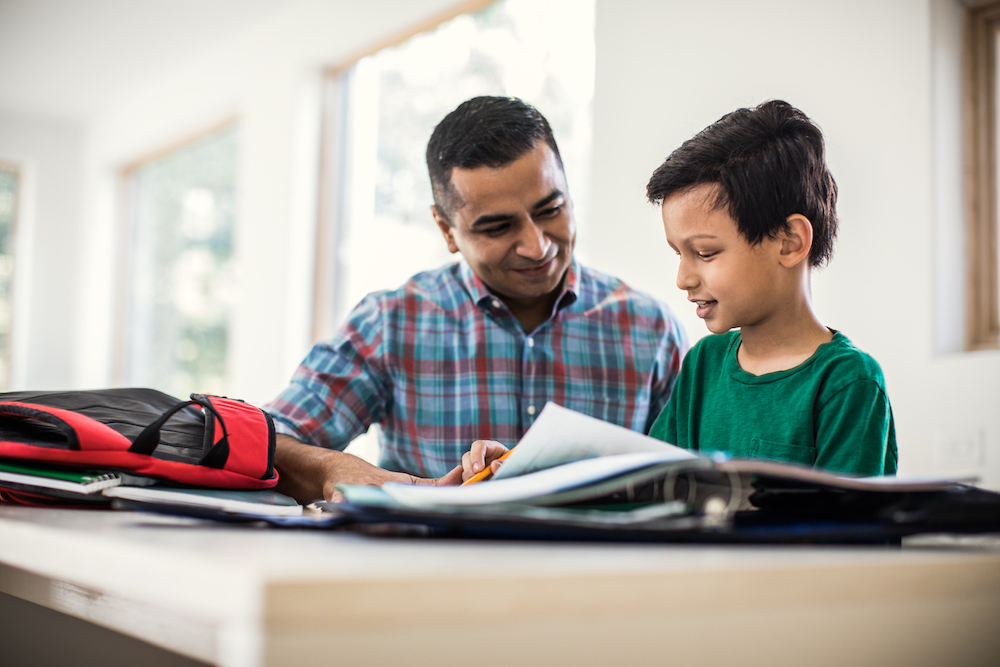Supporting your child’s mental health this school year

Tips to help guide your child through new challenges this school year
The 2020-2021 school year likely looks very different from ever before. With everything so uncertain, things may continue changing for some time—and the need to constantly adjust has the potential to affect everyone’s mental health.
Children are especially vulnerable as they adapt to a whole new learning experience. Some children are back in school virtually, while others are attending class in person. Others are doing some combination of both. No matter what your family’s experience is, it’s important to prioritize your child’s mental health as they transition to a new—and possibly shifting—normal.
Signs your child may be stressed
Getting up to speed with new school routines might feel like a rollercoaster. Some days it may feel like down is up and up is down, while things will run smoothly on other days. Uncertainty can put a strain on everyone’s mental health, and children may find it more difficult to stay centered while dealing with these kinds of adjustments.
Every child is different and reacts to stress in their own way. During this challenging time, it’s critical to monitor any changes you see in your child. The Centers for Disease Control and Prevention (CDC) recommends watching for common behavioral changes: [1]
- Excessive crying or irritation in younger children
- Returning to behaviors the child has outgrown (for example, toileting accidents or bedwetting)
- Excessive worrying or sadness
- Unhealthy eating or sleeping habits
- Irritability and “acting out” in teens
- Slipping academic performance
- Increased absences (avoiding school)
- Difficulty paying attention
- A lack of interest in hobbies
- Unexplained headaches or body pain
- Use of alcohol, tobacco, or other drugs
Tips and activities to improve your child’s mental health at home
In addition to the uncertainty of COVID-19, the lack of the school structure children are used to can affect mental health. Keeping children happy and safe at home can be difficult when they’re craving the stability and socialization that comes with a regular school schedule. Having a plan for adding that structure back in and keeping kids entertained can make things easier on them and on you.
Try these ideas to see which ones work best for your family [2].
Maintain routines or build new ones
- Keep getting up, eating meals, and going to bed at the same times every day.
- Schedule times for learning, homework, and breaks.
- Include physical activity in your schedule. You can spend time in your yard exploring nature, kicking a ball, or playing tag. If space is limited, try using hula hoops or playing hopscotch.
Help your child get excited about books
- Read and discuss books with your child. Ask questions about the stories and try to guess what will happen next.
- If you have an older child, ask him or her to write a book report or craft a story based on a chosen theme.
- Once you’ve read all the books in your home, turn to your local library. It may offer e-books or audiobooks that you can borrow.
Use everyday activities as learning opportunities
- Turn cooking meals into math or science lessons.
- Measurements can be turned into math problems; baking can become a science lesson.
- Talk with your child about your plants’ life cycles while tending to your garden or lawn.
- Make spelling fun by letting your child write words on your windows using dry-erase markers. Make sure your child has supplies to clean up with when the fun is done.
- Have your child practice proper hand-washing techniques. Afterward, teach your child about how germs spread.
Help your child maintain social connections
- Reach out to friends and family by phone or through video chats.
- Write cards or letters to family members or friends whom your child can’t safely visit.
Help for parents
If you’re feeling overwhelmed by meeting virtual schooling expectations, reach out to UPMC Health Plan. As a member, you have access to resources to help you manage your stress or anxiety and support your mental health. Call Member Services at the number on the back of your member ID card for information on the resources available to you.
Finding child care may also be difficult right now. Knowing where to turn and what resources are available is important. The websites listed below can help families find a nanny or babysitter independent of a placement agency. These sites allow parents to place an advertisement for a caregiver or browse the resumes of nannies and babysitters who are looking for a child care position. Click on the following links for additional information:*
- www.sittercity.com
- www.nannyavailable.com
- www.nannylane.com
- www.care.com
- www.urbansitter.com
- www.gonannies.com
- www.seekingsitters.com
- www.care4hire.com
*There may be fees associated with these services. Parents are responsible for checking references. These links are provided for your convenience, and the associated organizations are not affiliated with UPMC Health Plan.
[1] Centers for Disease Control and Prevention (CDC). Helping Children Cope. CDC. Updated July 1, 2020. Accessed September 4, 2020. https://www.cdc.gov/coronavirus/2019-ncov/daily-life-coping/for-parents.html
[2] Quarantining with a child [Flyer]. Workpartners. May 20, 2020.



